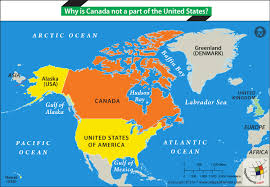I came across this article I wrote for a Canadian audience over twenty years ago. It is now a proposal. I only made minor changes.
The biggest problem with the union of Canada and the United States is that it would reduce the number of competing political jurisdictions in the world. This is almost always bad. The more political jurisdictions we have competing for residents, the less oppressive any of them can be. That’s why no state in the United States has dared to set a marginal income tax rate higher than 15%. If it were to do that, it would lose a large percentage of its top earners. It is also what limits state governments to limiting the level of social benefits. [Since I wrote this, California has come close to 15%. The reason the state government can do so, I think, is that it can take a lot of people’s money before they’re willing to leave for more-hostile weather.]
If it raised them too high it would gain residents, but the kind that would gain are those who want prosperity, not those who are productive. Given that both the state Supreme Courts and the U.S. Supreme Court have ignored many of the limitations placed on government in their constitutions, this political competition is one of the few limitations left.
This could come as a surprise to Canadians, who don’t see much political competition between provinces to keep tax rates low. They are right in observing the empirical fact, but the empirical fact is itself a proof of what I say. What limits competition among Canada’s provinces is a huge implicit tax that the federal government imposes on the provinces that keep tax rates low, and a huge subsidy on those that keep tax rates high. The tax is called “equalization payments.” A province like Alberta that keeps tax rates low will see its per capita income rise faster than that of other provinces and will therefore be a greater net contributor to the equalization. A province like Newfoundland, Quebec, New Brunswick or Manitoba that sets tax rates high and hurts the economy in other ways will see equalization payments to itself increase. Thus, federal policy has limited tax competition. This, by the way, is why it was so important for former Chancellor of the Exchequer Paul O’Neill to oppose (which he thankfully did) the EU’s (or OECD’s – I forget which) attempts to reduce tax competition between countries to limit.
So those who want more economic freedom and the associated economic growth that comes with it should not push for mergers of countries, but for the breakup of countries. That’s why I, for example, would like to see the United States split into smaller jurisdictions. We would have more political competition, lower tax rates and, as a side benefit, a less powerful US military (because there would be no US anymore)
There is a disadvantage. Political jurisdictions that are independent tend to restrict trade across borders, something states and provinces cannot legally do. But in this era of negotiated trade deals to reduce tariffs, that is a much smaller danger than when the American states were merged in 1787.

